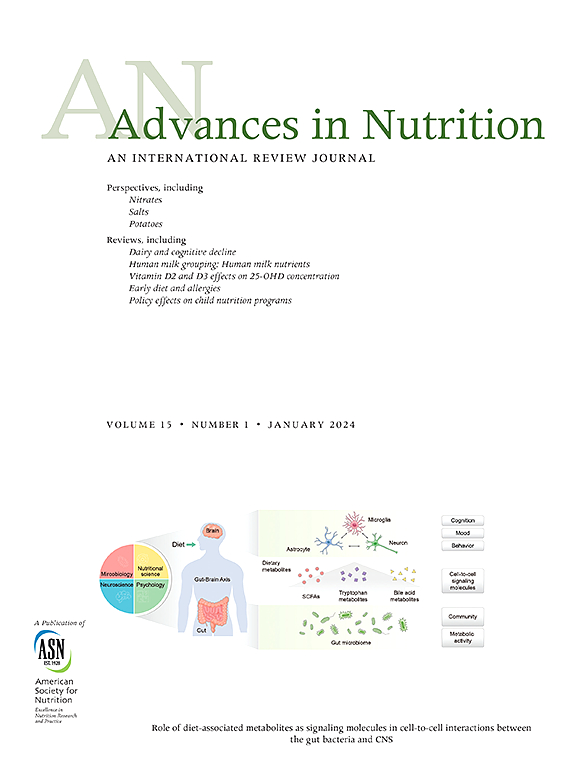共同创建和绘制美国拉丁裔人口的纯母乳喂养框架:一个综合框架调整过程和范围审查。
IF 9.2
1区 医学
Q1 NUTRITION & DIETETICS
引用次数: 0
摘要
背景:在拉丁裔人群中增加纯母乳喂养有可能减少健康差距。有必要建立一个多层次和多领域的纯母乳喂养决定因素框架。目的:在拉丁裔人群中共同建立一个专门的母乳喂养决定因素框架;方法:我们的社区联盟召集了工作组,为拉丁裔人群的纯母乳喂养调整了一个包含20个细胞(4个水平x 5个结构域)的多层次和多结构域决定因素框架。我们在工作组中记录了所有参考的决定因素,两个独立的评判员通过单元(水平域)演绎和归纳分析了这些特定的决定因素。一项综合范围审查将美国拉丁裔纯母乳喂养干预文献中的决定因素映射到框架细胞上。两名独立评价员逐字转录干预描述,并使用我们的决定因素列表作为代码本对文本进行演绎分析。归纳分析允许出现的决定因素。我们绘制了按主题处理的决定因素。结果:共有111个特定的决定因素被纳入工作组,分为53个决定因素主题。除了建筑环境(n=3)外,大多数研究都研究了每个领域的个体水平决定因素(n=11-16)。在人际层面,主要涉及行为(n=11)和医疗保健系统(n=16)领域。在社区层面,研究了建筑环境(n=14)和卫生保健系统(n=15)领域。大多数社会层面的研究涉及卫生保健系统领域,但没有涉及生物、行为或建筑环境领域。在所有56个主题中,延伸护理、文化相关护理、知识和技能、母婴关系和医生-夫妻关系被引用最多(每个主题n≥13)。结论:在拉美裔人群中增加纯母乳喂养是一个多方面的挑战。未来工作的创新领域包括超越个人层面的生物和社会文化领域以及社会层面的大多数领域。本文章由计算机程序翻译,如有差异,请以英文原文为准。
Co-creating and Mapping an Exclusive Breastfeeding Framework among Latino Populations in the United States: An Integrated Framework Adaptation Process and Scoping Review
Increasing exclusive breastfeeding among Latino populations has the potential to reduce health disparities. There is a need for a multilevel and multidomain framework of exclusive breastfeeding determinants. This study aimed to co-create an exclusive breastfeeding determinants framework among Latino populations and map this framework using the current literature. Our community coalition convened in working groups to adapt a multilevel and multidomain determinants framework with 20 cells (4 levels × 5 domains) for exclusive breastfeeding among Latino populations. We documented all referenced determinants in working groups, and 2 independent raters deductively and inductively analyzed these specific determinants into themes by cell (level domain). An integrated scoping review mapped the determinants addressed in the literature of exclusive breastfeeding interventions among Latinos in the United States onto the framework cells. Two independent raters transcribed intervention descriptions verbatim and deductively analyzed the text using our list of determinants as the codebook. Inductive analysis allowed for emerging determinants. We mapped determinants that were addressed by theme. A total of 111 specific determinants were referenced in working groups that were categorized into 53 determinant themes. Most studies addressed Individual-level determinants at each domain (n = 11–16 studies) except for Built Environment (n = 3). At the Interpersonal level, Behavior (n = 11) and Health Care System (n = 16) domains were predominantly addressed. At the Community level, Built Environment (n = 14) and Health Care System (n = 15) domains were addressed. Most studies at the Societal level addressed the Health Care System domain but none addressed Biological, Behavior, or Built Environment domains. Extension of care, culturally relevant care, knowledge and skills, mother–infant bonding, and practitioner–dyad relationship were referenced the most of all 56 themes (n ≥ 13 each). Increasing exclusive breastfeeding among Latinos is a multifaceted challenge. Innovative areas for future work include Biological and Sociocultural domains beyond the Individual level as well as most domains at the Societal level.
求助全文
通过发布文献求助,成功后即可免费获取论文全文。
去求助
来源期刊

Advances in Nutrition
医学-营养学
CiteScore
17.40
自引率
2.20%
发文量
117
审稿时长
56 days
期刊介绍:
Advances in Nutrition (AN/Adv Nutr) publishes focused reviews on pivotal findings and recent research across all domains relevant to nutritional scientists and biomedical researchers. This encompasses nutrition-related research spanning biochemical, molecular, and genetic studies using experimental animal models, domestic animals, and human subjects. The journal also emphasizes clinical nutrition, epidemiology and public health, and nutrition education. Review articles concentrate on recent progress rather than broad historical developments.
In addition to review articles, AN includes Perspectives, Letters to the Editor, and supplements. Supplement proposals require pre-approval by the editor before submission. The journal features reports and position papers from the American Society for Nutrition, summaries of major government and foundation reports, and Nutrient Information briefs providing crucial details about dietary requirements, food sources, deficiencies, and other essential nutrient information. All submissions with scientific content undergo peer review by the Editors or their designees prior to acceptance for publication.
 求助内容:
求助内容: 应助结果提醒方式:
应助结果提醒方式:


